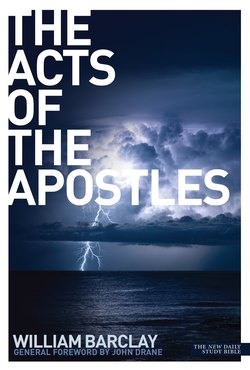Читать книгу The Acts of the Apostles - William Barclay - Страница 18
На сайте Литреса книга снята с продажи.
ОглавлениеTHE BREATH OF GOD
Acts 2:1–13
So when the day of Pentecost came round, they were all together in one place; and all of a sudden there came from heaven a sound like that of a violent, rushing wind, and it filled the whole house where they were sitting. And tongues, like tongues of fire, appeared to them, which distributed themselves among them and settled on each one of them. And they were all filled with the Holy Spirit, and they began to speak in other tongues as the Spirit gave them the power of utterance.
There were, staying in Jerusalem, Jews, devout men from all the races under heaven. When the news of this got abroad, the crowd assembled and came pouring together; for each one of them heard them speaking in his own language. They were all astonished and kept saying in amazement: ‘Look now! Are all these men who are speaking not Galilaeans? And how is it that each one of us hears them speaking in our own language in which we were born? Parthians and Medes, Elamites, those who live in Mesopotamia, in Judaea and Cappadocia, in Pontus, in Asia, in Phrygia and Pamphylia, in Egypt and the parts of Libya round about Cyrene, Romans, who are staying here, Jews and proselytes, people from Crete and Arabia – we hear these men telling the wonders of God in our own tongues.’ They were all astonished and did not know what to make of it, and they kept on saying to each other: ‘What can this mean?’ But others kept on saying in mockery: ‘They are filled with new wine.’
THERE were three great Jewish festivals to which every male Jew living within twenty miles of Jerusalem was legally bound to come – the Passover, Pentecost and the Feast of Tabernacles. Pentecost means ‘the Fiftieth’, and another name for Pentecost was ‘the Feast of Weeks’. It was so called because it fell on the fiftieth day, a week of weeks, after the Passover. The Passover was celebrated in the middle of April; therefore Pentecost fell at the beginning of June. By that time, travelling conditions were at their best. At least as many came to the Feast of Pentecost as came to the Passover. That explains the list of countries mentioned in this chapter; never was there a more international crowd in Jerusalem than at the time of Pentecost.
The feast itself was significant in two ways. (1) It had a historical significance. It commemorated the giving of the law to Moses on Mount Sinai. (2) It had an agricultural significance. At the Passover, part of the first crop of barley was offered to God; and at Pentecost two loaves were offered in gratitude for the safe gathering in of the harvest. It had one other unique characteristic. The law laid it down that on that day people should not do their everyday work (Leviticus 23:21; Numbers 28:26). So it was a holiday for everyone, and the crowds on the streets would be greater than ever.
What happened at Pentecost we really do not know, except that the disciples had an experience of the power of the Spirit flooding their beings such as they had never had before. We must remember that, for this part of Acts, Luke was not an eyewitness. He tells the story as if the disciples had suddenly acquired the gift of speaking in foreign languages. For two reasons, that is not likely.
(1) There was in the early Church a phenomenon which has never completely disappeared. It was called speaking with tongues (cf. Acts 10:46, 19:6). The main passage which describes it is 1 Corinthians 14. What happened was that someone, in an ecstasy, began to pour out a flood of unintelligible sounds in no known language. That was supposed to be directly inspired by the Spirit of God and was a gift greatly coveted. Paul did not approve of it, because he preferred that a message should be given in a language that could be understood. In fact, he said that a stranger coming in might well think that the members of the congregation were mad (1 Corinthians 14:23). That precisely fits Acts 2:13. People speaking in tongues might well appear to be drunk to someone who had never witnessed the phenomenon.
(2) To speak in foreign languages was unnecessary. The crowd was made up of Jews (verse 5) and converts (verse 10) – Gentiles who had accepted the Jewish religion and the Jewish way of life. For a crowd like that, at most two languages were necessary. Almost all Jews spoke Aramaic; and, even if they were Jews of the dispersion from a foreign land, they would speak the language which almost everyone in the world spoke at that time – Greek.
It seems most likely that Luke, a Gentile, had confused speaking with tongues with speaking in foreign languages. What happened was that, for the first time in their lives, this mixed crowd was hearing the word of God in a way that struck straight home to their hearts and that they could understand. The power of the Spirit was such that it had given the disciples a message that could reach every heart.
